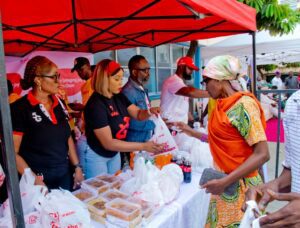
Outrage over 17 years highest inflation rate of 19.64%
…Political leadership reason for continuous increase — Oyedokun
…Current administration has brought retrogressive policies on economies, governance — Odewale
…FG must restudy concept paper of ‘Operation Feed the Nation’ to induce investors — Tajudeen
…Inflationary pressures weaken purchasing power of citizens — Muda Yusuf
By Matthew Denis Abuja, Ariemu Ogaga Abuja, Seun Ibiyemi and Uthman Salami
Nigeria’s inflation rate has recorded the highest level of19.64 per cent year-on-year basis in the last 17 years according to data obtained from the National Bureau of Statistics (NBS).
This surge has been attributed to currency depreciation, high transportation cost as a result of high cost of energy, disruption in food supply system and other factors.
Other factors identified include the increase in inflation rate due to an increase in import costs as a result of currency depreciation, as well as general increase in the cost of production.
While critics and analysts alike see this recent spike as a failure of political leadership, which continues to melt obnoxious economic policies on Nigerians. Others called on the federal government to revisit the concept paper of Operation Feed the Nation to encourage more investors into Agricultural sector.
Speaking on the release of the Consumer Price Index (CPI) released by the Bureau in Abuja, the Statistician-General of the Federation and Chief Executive Officer, National Bureau of Statistics (NBS) Prince Semiu Adeniran, said the CPI measures the average change over time in the prices of goods and services consumed by people for day-to-day living.
He said it is a core macroeconomic indicator used in the derivation of the inflation rate for policy, planning, and monitoring of an economy.
Adeniran said, “This is 2.27 per cent points higher compared to the rate recorded in July 2021, which was 17.38 per cent.
“This shows that the headline inflation rate increased in July 2022 when compared to the same month in the previous year of July 2021.
“This means that in July 2022, the general price level was 2.26 per cent higher than in July 2021.”
He said increases were recorded in all Classification of Individual Consumption by Purpose (COICOP) divisions that yielded the Headline index.
On a month-on-month basis, the headline inflation rate in July 2022 was 1.817 per cent, which was higher than the rate recorded in June 2022 at 1.816 per cent.
“The percentage change in the average CPI for the twelve months ending July 2022 over the average of the CPI for the previous twelve months period was 16.75 per cent.
“This is showing a 0.46 per cent increase compared to 16.30 per cent recorded in July 2021,” he said.
Adeniran said the composite food index on a year-on-year basis was 22.02 per cent in July 2022, showing a rise compared to 21.03 per cent in July 2021.
He said the rise in the food index was caused by increase in prices of Bread and cereals, Food products, potatoes, yam, and other tubers, meat, fish, oil, and fat.
The statistician-general said on a month-on-month basis, the food sub-index in July 2022 was 2.04 per cent lower than the 2.05 per cent recorded in June 2022.
“The index for all items less farm produce (Core inflation), which excludes the prices of volatile agricultural produce, stood at 16.26 per cent in July 2022 on a year-on-year basis.
“This was higher when compared to 13.72 per cent recorded in July 2021. On a month-on-month basis, the core sub-index was 1.75 per cent in July 2022 higher when compared to 1.56 per cent recorded in June 2022.
He said the highest increases were recorded in prices of gas, liquid fuel, solid fuel, passenger transport by road, passenger transport by air, garments, cleaning, repair and hire of clothing.
Adeniran said on a year-on-year basis, in July 2022, the urban inflation rate was 20.09 per cent, 2.08 per cent higher compared to 18.01 per cent recorded in July 2021
He said on a month-on-month basis the urban inflation rate was 1.82 per cent in July 2022, showing a decline compared to June 2022 at 1.82 per cent.
Adeniran said the rural inflation rate in July 2022 was 19.22 per cent on a year-on-year basis, which were 2.47 per cent higher compared to the 16.75 per cent recorded in July 2021.
“On a month-on-month basis, the rural inflation rate in July 2022 was 1.811 per cent, which was higher compared to June 2022 at 1.809 per cent.”
Adeniran said all Items Inflation for the states in July 2022 on a year-on-year basis was highest in Akwa Ibom with 22.88 per cent, followed by Ebonyi with 22.51 per cent, and Kogi with 22.08 per cent.
The Statistician-General said the slowest rise was recorded in Jigawa with 16.62 per cent, followed by Kaduna State with 17.04 per cent and Borno with 18.04 per cent.
Adeniran said on a month-on-month basis, July 2022 recorded the highest increase in Adamawa with 2.87 per cent, followed by Abuja with 2.84 per cent, and Oyo State with 2.77 per cent.
“While Bauchi recorded the slowest rise on month-on-month inflation with 0.82 per cent, followed by Kano State with 0.83 per cent and Niger State with 1.03 per cent.”
He said Food Sub-index Inflation for the states in July 2022 on a year-on-year basis was highest in Kwara with 29.28 per cent, followed by Akwa Ibom with 27.22 per cent, and Kogi with 26.08 per cent.
The Statistician-General said Kaduna State recorded the slowest rise in food inflation year-on-year with 17.16 per cent, followed by Jigawa with 17.46 per cent and Anambra with 19.25 per cent.
Adeniran said on a month-on-month basis, the food inflation sub-index was highest in Kwara with 3.90 per cent, followed by Delta with 3.61 per cent, and Benue with 2.94 per cent.
While he said Taraba, Gombe, and Niger recorded the slowest rise in month-on-month inflation with 0.14 per cent, 0.94 per cent, and 1.13 per cent respectively.
Political leadership reason for continuous increase — Oyedokun
Speaking with Nigerian NewsDirect on Monday, an economic analyst and Professor of Management and Accounting, Leads City University, Ibadan, Godwin Oyedokun said political leadership is the reason for Nigeria’s continuous inflation increase.
According to Prof Oyedokun, “It is a pity for us as a Country, I pray that things do not go worse than this.
“What this means is that we have lost 19.64% of the value of everything. For everything that is N1 before has been 19.64% higher in cost.
“Meaning the state of living has become extremely high in Nigeria with commemorate supports from the government. You pay for your electricity, security, water bills yourself and basically everything.
“The problem we have is poor leadership and cost of governance. The ideology of those in power leaves us with this problem,” he stated.
Current administration has brought retrogressive policies on economies, governance — Odewale
Responding, the Kwara State Former Commissioner of Planning and Economic Development, Wasiu Odewale said “this Government has retrogressive Policies on our economy and governance.
“We are in for a big problem after this administration of Pres Muhamnadu Buhari except we vote in people of great ideas and economic future thinking teams with vibrant private sector experience and technocrat to resure this country first before another economic world war looming in Nigeria.
“Today, you have food crises, security crises, aviation sector crisis, education sector crisis, transportation crisis, ASUU crisis, Doctors on strike, dollar crisis, manufacturers battling with diesel and all and all. Still we keep on borrowing to finance recurrent expenditures and comfort of the ruling party.”
According to him this Government lacks Vision and only mission is to rule.Today, we are in for that mistakes of 2015.
FG must restudy concept paper of Operation Feed Nation to induce investors — Tajudeen
On his part, the National Vice Chairman of Nigerian Association of Small Medium Enterprise (NASME) North Central, Prince Ajisefinni Ayodeji Tajudeen said the government should study the concept paper of Operation Feed the Nation to inject more private investors into farm mechanization ventures. Private security companies to take opportunities in providing security guards for farmers and also provision of solar pumping irrigation on lease basis from private companies.
He said, “The drop in food production is associated to Climate weather change, insecurity in the country, high cost of farm inputs and reduction in number of farmers.
“All these lead to high cost of farm produces and purchasing power of consumer has reduced drastically.
“Moreover, government at state and local governments create platform for relevant Organised private sectors to do public advocacy on Youth engagement in Agribusiness and vocational Enterprise.”
Prince Ajisefinni stressed that the government should encourage consumption of Made in Nigeria Products and this must start from the government officials, noting that adoption of the suggestion would reduce the inflation rate and stabilise our economy.
…Inflationary pressures weaken purchasing power of citizens — Muda Yusuf
On his part, CEO Centre for the Promotion of Private Enterprise (CPPE), Dr Muda Yusuf said the mounting inflationary pressures weakens the purchasing power of citizenry.
According to him, “Mounting inflationary pressures weaken purchasing power of citizens as real incomes are eroded, it aggravates pressure on production costs, negatively impacts profitability, erodes shareholders value and undermines investors confidence.
“In many cases, increase in production costs cannot be transferred to consumers. The implication is that producers are also taking a hit.
“This is more pronounced where the demand for the product is elastic. These are products that consumers can readily do without.
“Tackling inflation requires urgent government intervention to address the challenges bedeviling the supply side of the economy and the moderation of fiscal deficit monetization,” he stated.



